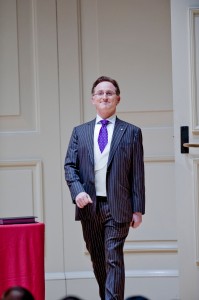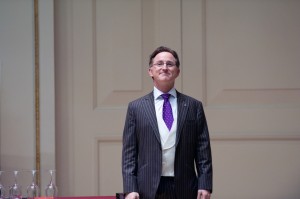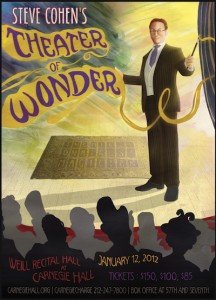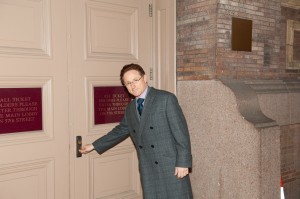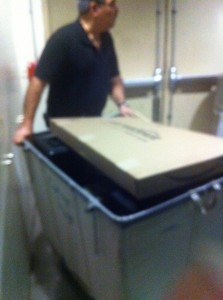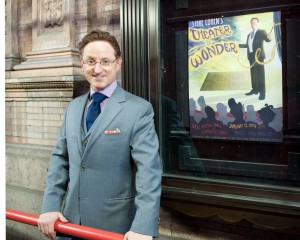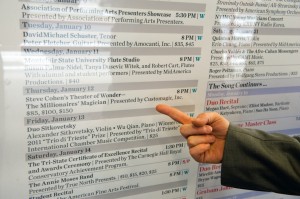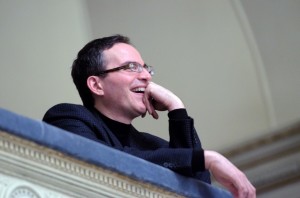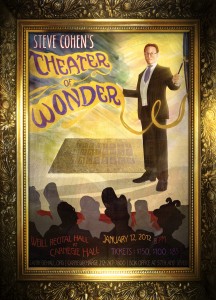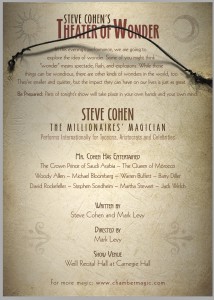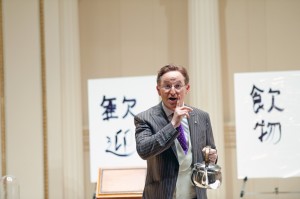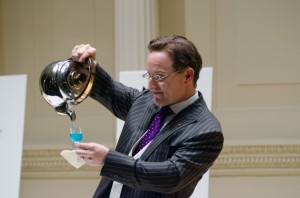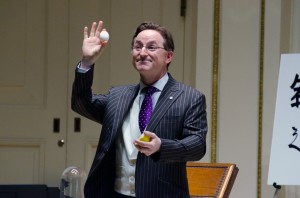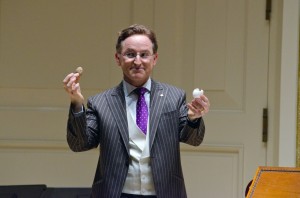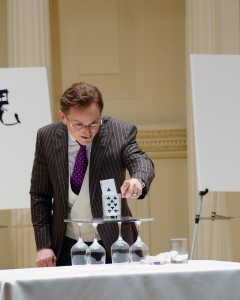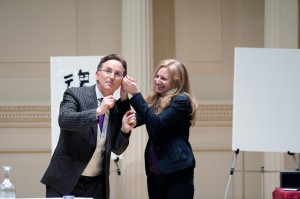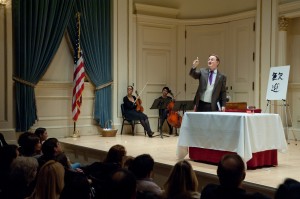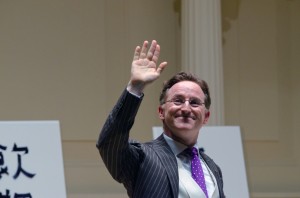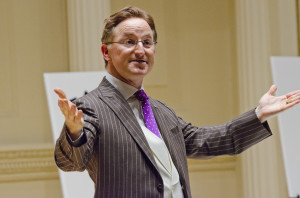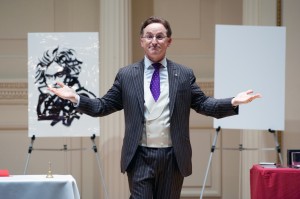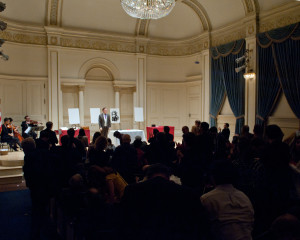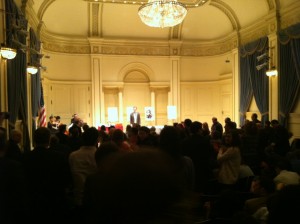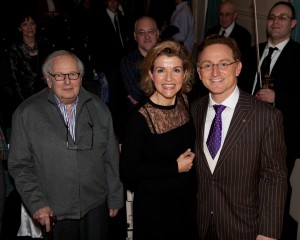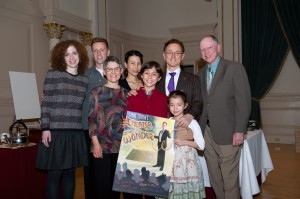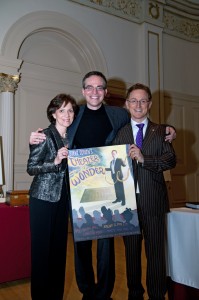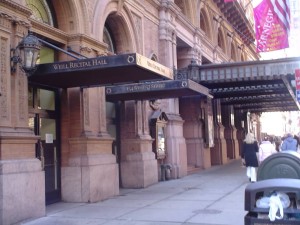How do you get to Carnegie Hall? Here’s how.
January 19, 2012
For over one hundred twenty years, Carnegie Hall has been a world-famous venue for music, but not magic. It was an honor, then — a once-in-a-lifetime achievement — to be able to perform my full evening magic show there on January 12, 2012. The show ran two hours, and received a standing ovation from the sold-out auditorium.
I’d like to thank all of you who came to the show. I’ll always remember the electric anticipation you projected as I walked on stage. Looking out at you, I felt anticipation too — like we were creating a historic moment together.
Throughout my career I’ve always believed that magic has the potential to stand shoulder-to-shoulder with other performing arts, such as ballet, opera and orchestral music. Magic can be more, much more, than a simple diversion. The artistry required to construct and stage a theatrical magic show is on par with the training, thought and creativity required to present other traditional art forms.
My personal goal in staging a magic show at Carnegie Hall was to prove that the art of magic is capable of accepting its due respect, if only we give it the chance. It was immensely satisfying to see that the public supported this belief; the entire theater was sold-out months in advance.
Because I am used to performing for small audiences of 50 people at the Waldorf-Astoria, the nearly 300-seat Weill Recital Hall presented some challenges. I did my best to cross the footlights and reach out to the entire audience, even up to the balcony.
In this blog, I’ve composed a full report of the evening, from my perspective as performer and producer, along with photos taken by David Linsell. (Click any photo to view larger)
HOW THE SHOW WAS CONCEIVED
In November 2010 my dear friend, violinist Anne-Sophie Mutter was visiting New York from Munich. She was in town to perform a series of music concerts at Carnegie Hall. On her off-night, we met up for a drink in the Bull & Bear (at the Waldorf-Astoria) and she asked me, “What’s next? You’ve been performing here for small audiences for many years, and you can keep doing this as long as you wish. But what is next?”
Anne-Sophie told me that a world-class act deserves a world-class stage, and that I should attempt a larger show that could be seen by more people. “After all,” she said, “look at me. I’m performing in Carnegie Hall tomorrow night.”
That comment inspired me to take action, and I immediately contacted my collaborator Mark Levy. I asked him, “Are you in?” He replied, “Without a doubt.”
Fortunately the executives at Carnegie Hall had heard of my Waldorf-Astoria shows, and they were willing to take a meeting with me regarding a potential date. At first they declined my request, insisting that magic shows are not the type of performance that they typically present. My manager Holly Peppe and I had to explain that this was not a Las Vegas style show with animals and explosions, but more of a spoken word performance.
After a great deal of negotiation over the following three months, we decided on a date in the Weill Recital Hall – January 12, 2012.
I had ten months to prepare.
Fast forward to the day of the event…
ARRIVING AT CARNEGIE HALL
A production van picked me up at 3:00pm at my Upper West Side apartment. My father and brother helped load the van with my show equipment, and we arrived at the stage door of Carnegie Hall fifteen minutes later.
The stagehands assigned to my show put me at ease right away, and loaded my equipment into a large rolling basket. We entered the service elevator and got off on the third floor.
Here are some photos from the outside of the hall, taken the day before:
In order to perfect my Carnegie Hall material, I had been rotating the newer routines into my Chamber Magic® shows at the Waldorf for several weeks. Fortunately this gave me a lot of time to practice the newer acts “under fire,” and feel how they fit together as a whole. One week prior to Carnegie, I gave one complete run-through of “Theater of Wonder” at the Friars Club, where I am a member. Nearly two hundred members showed up for that performance, and I had a chance to refine the blocking for the stage show.
Since I am used to working in a smaller setting at the Waldorf week after week, standing on stage at Carnegie Hall was a bit awkward at first. The two hour rehearsal time (from 4 to 6pm) gave me a chance to tread the boards and internalize the space. Performing on a new stage is like trying to cook in somebody else’s kitchen. You reach for a spatula, and it’s not where you expect it to be.
Mark Levy was in the balcony during the rehearsal, shouting out comments as I moved about the stage. By the time the rehearsal was over, the show was blocked and I had a good feeling.
The stage furniture was all provided by Carnegie Hall, since they have a rigid policy regarding what is and is not allowed on stage. I would have much preferred to use elegant antique wooden tables, but was limited to using institutional tables draped in plain tablecloths. No additional set furniture was permitted. According to the hall contract, all of my props had to be hand-held size, and must start on the tables provided or in my pockets. These are all new rules for me, so we had to accommodate these design parameters during the planning stage.
My four assistants arrived at 6:00pm, so I broke from the rehearsal to meet with them and go over their cues. It was a welcome distraction to meet and joke with them – it took my mind off the performance for a bit. These four young ladies (Bianca Bryan, Jame Rose, Patricia Santomasso, Mary Orzano) have worked with me for years at the Waldorf, so they know my show cold. Speaking to them was like writing in shorthand – they instantly knew what was needed of them, even though the venue was different.
My musical trio also arrived at 6pm. Their names are Lev Ljova Zhurbin (viola), Monica Davis (violin) and Amali Premawardhana (cello). I invited them to play classical music both before and after my performance, as a nod towards the hall’s traditional use, and to acknowledge its original name: Carnegie Chamber Music Hall. Having live music on stage was an important detail; no recording can imitate the impact of hearing talented artists play in person.
WAITING BACKSTAGE
By this point, my mind was hyper-alert, my body surging with positive energy. I became keenly aware of small details: a fleck of dust on my lapel, the shuffling of people’s feet down the hall. The entire show ran through my head — like a fast-forwarded movie — and as it neared the end I came to the calm conclusion: “I can do this.” I’d trained my entire life for this moment. Planning was no longer necessary. There was nothing else I could do now except go out and perform.
SHOW PHOTOS
Meanwhile back in the lobby, guests were instructed to write the names of their favorite drinks on white index cards and drop their requests into a basket. This activity “tipped off” the fact that I would be performing Think-a-Drink during the show. On their way into the theater, guests received a red envelope and a show program.
Here is the front and back of the program:
My assistant Bianca Bryan walked on stage from the wings and set my magic teapot onto the rear table. She then stepped forward and announced: “Ladies and gentlemen, welcome to Theater of Wonder. In the lobby you received a red envelope. Please do not open the envelope until later in the show. We will tell you when to do so. Also, please take this time to silence your cell phone. If it rings during the show, Steve will have to make it disappear! And now it gives me great pleasure to introduce to you… the incredible Steve Cohen.”
Dennis the stage manager opened the door and I made my entrance.
I performed:
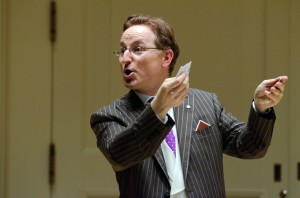
An interactive card trick that everyone could do with me, using cards from the red envelope. The magic happened in their own hands.
The standing ovation from a sold-out audience at Carnegie Hall was a dream come true:
Here is another view from the rear:
ANNE-SOPHIE MUTTER IN THE AUDIENCE
It was extremely meaningful that Anne-Sophie Mutter flew from Germany to NYC for just one night, before flying back to Europe the next morning. If it weren’t for her inspiration, I would never have even considered this performance in the first place.
Here is a photo of the two of us, with André Previn, and composer Sebastian Currier.
Anne-Sophie told me that she’s performed in Carnegie Hall dozens of times, but she’s never actually walked in through the front door! We both had a laugh at that.
THE AFTERMATH
After greeting the audience, and signing autographs, I took a few photos onstage with my family:
And with Holly Peppe and Mark Levy:
I can honestly say that Holly was the driving force behind this evening’s success. There were hundreds of details that required our ongoing attention over the ten-month process leading up to the show; she took them all in stride. No one could have asked for a better, or more patient business partner.
Mark Levy has been my closest friend and adviser over the past twelve years. Everything I do and say on stage has Mark’s brilliant handiwork all over it. Together we make a great team, starting with Chamber Magic®, then Miracles at Midnight, and now Theater of Wonder. He makes me laugh like no one else, and his magic and storytelling skills are my secret weapon.
Before long we were alone among the sea of empty seats and the color, light, music and warmth of the applause were just a memory. My bags packed and loaded, we loaded up the van and I headed uptown.
I slept like a baby that night. A year’s worth of tension and stress melted away and my muscles unwound as if I had spent a week in Hawaii. Decompression at last, but not for long: I had five sold-out Chamber Magic® shows at the Waldorf-Astoria that weekend, starting the very next day!
PERSONAL OBSERVATIONS
Overall, the show was a success, both artistically and financially. I am honored to be among the few magicians in history who have ever appeared in Carnegie Hall. According to my research, other performers of note include: Cardini, Richard Himber, Al Delage, and Kreskin.
I took some risks that didn’t play out as well as I had liked. But I learned from studying the career of the great Chan Canasta that the reward is much greater when you challenge yourself to take risks. At a one-night only event, you can’t repeat any moments – they present themselves, and then slip away. As I perform Theater of Wonder more often, I look forward to playing with these moments and molding them to build even stronger presentations.
The ultimate compliment of the evening was that Clive Gillinson, executive and artistic director of Carnegie Hall, attended the show and loved it. I received an email from his staff the next day saying, “What a resounding success in Weill Recital Hall last night! I hope a return is in order SOON!”
I can foresee another performance at Carnegie Hall in the future. It would be wonderful to start an annual tradition. Time to start working on it!
